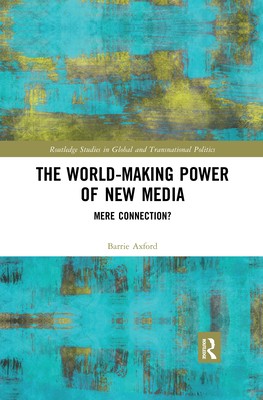
- We will send in 10–14 business days.
- Author: Barrie Axford
- Publisher: Routledge
- ISBN-10: 0367425564
- ISBN-13: 9780367425562
- Format: 15.5 x 23.1 x 1.8 cm, softcover
- Language: English
- SAVE -10% with code: EXTRA
Reviews
Description
In this new work, Axford seeks to contribute to the development of global theory, particularly where it engages with the contested idea of globality; a concept which musters as consciousness, condition, framework, even system.
By examining emergent globalities through the lens of world-making communicative practices and forms, the author demonstrates their transformative social power and underlines the cultural dynamics of globalization. Taking a critical view of much of the current scholarship on emergent globalities, Axford steps outside the rationalist-territorialist conceptions of association and order and takes issue with those who advise there is a widespread 'myth' of media globalization. The book examines global communicative connectivity, using digital, or new media - especially the Internet - as the prime exemplar of global process.
As well as the academic importance of such themes for theory-building, the strategic, real-world impacts of communicative connectivity are palpable. Thus, the welter of debate around the influence of the Internet on democracy, democratization, revolt and collective action generally, have real purchase when discussed in relation to the events of the uprisings in MENA, anti-capitalist protests in London and New York and the tribulations of the EU in recent months/years. Using such exemplars the book assesses claims for the existence and robustness of global society, the significance of cosmopolitan communication and the extent of global consciousness.
This work will be of interest to students and scholars of globalization, international relations, and media and cultural studies.
EXTRA 10 % discount with code: EXTRA
The promotion ends in 17d.19:12:59
The discount code is valid when purchasing from 10 €. Discounts do not stack.
- Author: Barrie Axford
- Publisher: Routledge
- ISBN-10: 0367425564
- ISBN-13: 9780367425562
- Format: 15.5 x 23.1 x 1.8 cm, softcover
- Language: English English
In this new work, Axford seeks to contribute to the development of global theory, particularly where it engages with the contested idea of globality; a concept which musters as consciousness, condition, framework, even system.
By examining emergent globalities through the lens of world-making communicative practices and forms, the author demonstrates their transformative social power and underlines the cultural dynamics of globalization. Taking a critical view of much of the current scholarship on emergent globalities, Axford steps outside the rationalist-territorialist conceptions of association and order and takes issue with those who advise there is a widespread 'myth' of media globalization. The book examines global communicative connectivity, using digital, or new media - especially the Internet - as the prime exemplar of global process.
As well as the academic importance of such themes for theory-building, the strategic, real-world impacts of communicative connectivity are palpable. Thus, the welter of debate around the influence of the Internet on democracy, democratization, revolt and collective action generally, have real purchase when discussed in relation to the events of the uprisings in MENA, anti-capitalist protests in London and New York and the tribulations of the EU in recent months/years. Using such exemplars the book assesses claims for the existence and robustness of global society, the significance of cosmopolitan communication and the extent of global consciousness.
This work will be of interest to students and scholars of globalization, international relations, and media and cultural studies.


Reviews